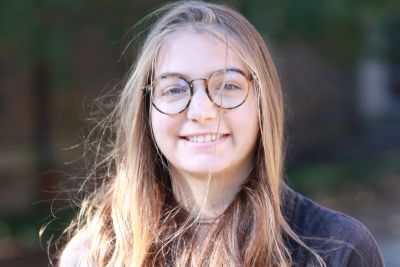Lisa Kinspergher, 2024-25 HOPE Center Visiting Scholar

Over the past century, political science shifted from an approach centered on an early form of behavioralism, which relied on sociology and psychology, to one centered on rational choice theory, which drew mostly from economic reasoning.
Because of that shift, many people see the evolution of political science as discontinuous.
But as Lisa Kinspergher, a 2024-25 HOPE Center Visiting Scholar, explains, “Today’s rational choice theorists are actually in continuity with the old behavioralists. They’re looking for the same thing the behavioralists looked for, something known as political equilibrium.”
A concept borrowed from economics (and by extension from physics), political equilibrium has meant to political scientists different things at different times.
“For the behaviorists, political equilibrium represented a desirable situation, when the powers of groups are balanced and the government reconciles conflicting interests,” says Lisa, who earned a BA from the University of Milan with a degree in international politics, law, and economics.
“For the rational choice camp, though, equilibrium means stable social choice—the result of preferences aggregated through game theory and social choice theory.”
Equilibrium has even found expression in a third way, clarifying the relationship between individual preferences as mediated by institutions.
“Looking at this another way,” says Lisa, “equilibrium evolved from being a metaphor to being a tool of analysis, and finally to being a fixed point, much like a market-clearing price.”
As Lisa explains, the changing status of equilibrium “reveals a narrative of increasing sophistication in the notion of equilibrium and a clearer understanding of what political scientists were looking for and what their theories could do.”
Born and raised in Bergamo, Italy, a mountain city north of Milan, Lisa knew early on that she wanted to pursue graduate work in the United States. She applied to several MA programs and chose Duke. When asked why, she almost seemed surprised at the question.
“Because I wanted to engage with the visitors and faculty at the HOPE Center!”
By then, she had discovered Friedrich Hayek, whose free-market ideas “resonated with my general view of the world.”
As Lisa recounts, most of the students in Milan were from the left, and although she could see their point of view, she felt that they underappreciated the benefits of a market economy.
During her MA years at Duke, Lisa took a class on the history of economics from Steve Medema. In her term paper she began exploring the role of equilibrium in political science and the transition from behavioralism to rational choice approaches.
She graduated from Duke in May. Her family from Milan attended the ceremony, and afterward they visited Charleston, Miami, and New Orleans.
Lisa is also writing about how nineteenth-century liberalism eventually split into two movements, classical liberalism and one called new or progressive liberalism.
“The division is reflected in what Isaiah Berlin calls negative and positive liberty, in the absence of restraint on one hand, and the provision of support on the other.”
A regular participant in the HOPE Center’s Friday workshops, Lisa has applied to PhD programs in political science and plans to continue her work on social choice theory and the methodological overlaps between economics and political science.